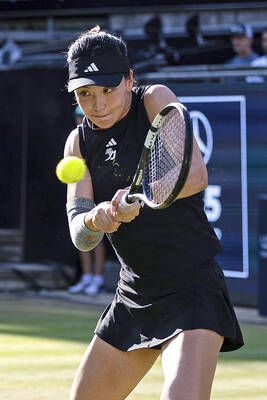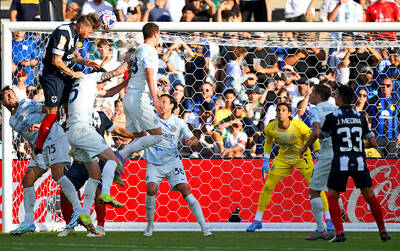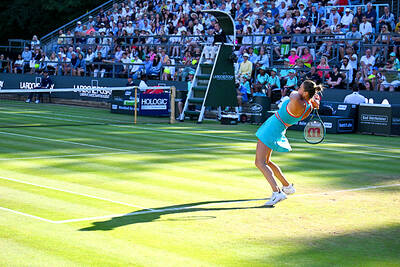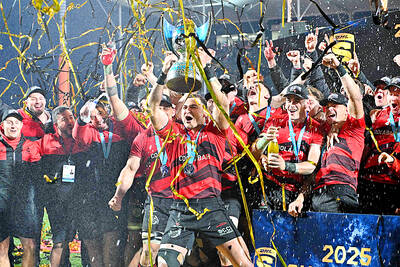All his life, Oscar Pistorius has had to battle adversity. Competing in the Beijing Olympics is a challenge the double-amputee runner may not be able to overcome.
The IAAF ruled on Monday that the South African is ineligible to compete in Beijing -- or any other sanctioned able-bodied competitions -- because his "Cheetah" racing blades are considered "technical aids" which give him a clear competitive advantage.
"An athlete using this prosthetic blade has a demonstrable mechanical advantage [more than 30 percent] when compared to someone not using the blade," the IAAF said.
The 21-year-old Pistorius had long learned not to consider his artificial legs a hindrance, even refusing to park his car in a spot for disabled people. Now the sport he learned to love as a teenager has thrown up a huge obstacle, just as he was making his name among the world's able-bodied athletes.
"That's a huge blow," said Pistorius' manager, Peet Van Zyl. "He has been competing in South African able-bodied competition for the past three years. At this stage it looks like he is out of any able-bodied event."
Van Zyl spoke briefly with Pistorius, saying he "could hear from his voice that he is disappointed."
Pistorius said last week he would appeal "to the highest levels" if the ruling went against him. He could take his case to the Court of Arbitration for Sport in Lausanne, Switzerland.
The International Olympic Committee said it "respects" the IAAF decision.
"This decision has nothing to do with Oscar Pistorius' athletic merits. What is important is to ensure fair competition," the IOC said in a statement.
South Africa's national athletics federation feels bound by the IAAF rules and must keep Pistorius out of some national races he has entered for several years.
"It rules him out with immediate effect. We use the IAAF rule book," South Africa federation president Leonard Chuene said. "If we had our rules and our own competition it would be easier. It is a huge problem."
Pistorius finished second in the 400m at the South African National Championships last year against able-bodied runners.
"It's unfortunate because he could have boosted team athletics at the Olympics," Chuene said.
The IAAF made its decision based on a study from German professor Gert-Peter Brueggemann, who found several indicators the Cheetah blades provided an unfair edge.
The federation said Pistorius had been allowed to compete in some able-bodied events until now because his case was so unique that such artificial protheses had not been properly studied.
"We did not have the science," IAAF spokesman Nick Davies said. "Now we have the science."
No one directly questioned the findings of Brueggemann. The producer of Pistorius' Cheetahs and the International Paralympic Committee said, though, that more tests should be undertaken before such a decision could be taken.
Considering the Olympics open less than seven months from now and that he still needs to run a qualifying time without having the right to compete in IAAF events further reduces the possibilities for Pistorius.
The ruling does not affect his eligibility for Paralympic events, in which he was a gold medalist in Athens in 2004.
The runner had worked with Brueggemann in Cologne for two days of testing in November to learn to what extent the J-shaped carbon-fiber extensions to his amputated legs differed from the legs of fully-abled runners.
Brueggemann found that Pistorius was able to run at the same speed as able-bodied runners on about a quarter less energy. He found that once the runners hit a certain stride, athletes with artificial limbs needed less additional energy than other athletes.
The professor found that the returned energy "from the prosthetic blade is close to three times higher than with the human ankle joint in maximum sprinting."
The IAAF adopted a rule last summer prohibiting the use of any "technical aids" deemed to give an athlete an advantage over another.
Pistorius has set world records in the 100m, 200m and 400m in Paralympic events.
Pistorius was born without fibulas -- the long, thin outer bone between the knee and ankle -- and was 11 months old when his legs were amputated below the knee.
He began running competitively four years ago to treat a rugby injury, and nine months later won the 200m at the 2004 Paralympic Games in Athens.
Pistorius competed in the 400m at two international-level able-bodied meets last year. He finished second in a B race in 46.90 seconds at the Golden League meet in Rome on July 13 and, two days later, was disqualified for running out of his lane in Sheffield, England.

Twelve days after winning her second Grand Slam title at the French Open, Coco Gauff fell at the first hurdle on grass in Berlin on Thursday as beaten Paris finalist Aryna Sabalenka advanced to the quarter-finals. Recipient of a first round bye, American Gauff lost 6-3, 6-3 to Chinese qualifier Wang Xinyu as world number one Sabalenka beat Rebeka Masarova 6-2, 7-6 (8/6) in her second round tie. Winner of 10 main tour titles, including the US Open in 2023 and the WTA Finals last year, Gauff has yet to lift a trophy in a grass-court tournament. “After I won the first

Sergio Ramos on Tuesday outfoxed two Inter players and artfully headed home the first goal for Monterrey at the FIFA Club World Cup. The 39-year-old Ramos slipped through the penalty area for the score just as he did for so many years in the shirts of Real Madrid and Spain’s national team, with whom he combined smarts, timing and physicality. Ramos’ clever goal and his overall defensive play at the Rose Bowl were major factors in Monterrey’s impressive 1-1 draw against the UEFA Champions League finalists in the clubs’ first match of the tournament. “There is always a joy to contribute to the

Top-ranked Aryna Sabalenka staged a “crazy comeback,” saving four match points before beating Elena Rybakina 7-6 (6), 3-6, 7-6 (6) in the quarter-finals of the Berlin Open on Friday. Sabalenka was 6-2 down in the final-set tie-breaker, but won six straight points to reach her eighth semi-final of the season. “Elena is a great player and we’ve had a lot of tough battles,” Sabalenka said. “I have no idea how I was able to win those last points. I think I just got lucky.” “I remember a long time ago when I was just starting, I won a lot of matches being down

The Canterbury Crusaders edged the Waikato Chiefs 16-12 in an intense Super Rugby Pacific final battle in Christchurch yesterday to claim their 15th title in 30 years of the Southern Hemisphere competition. Hooker Codie Taylor scored a try and Rivez Reihana contributed 11 points from the kicking tee as the most dominant team in Super Rugby history extended their perfect home playoff record to 32 successive matches since 1998. The Chiefs, who were looking for a first title since 2013, scored first-half tries through George Dyer and Shaun Stevenson, but were unable to register a point after the break and fell to